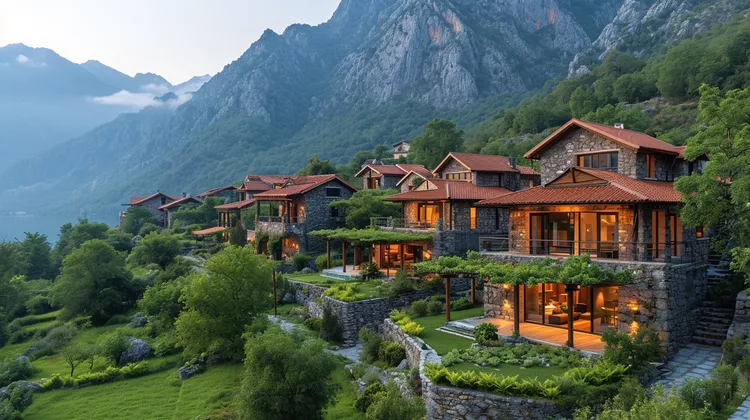
Buterin’s Zuzalu Retreat Spurs ‘Zu-Village’ Grants
Tucked away in the picturesque mountainous terrain of Montenegro, a tranquil retreat named Zuzalu has emerged as a source of inspiration and innovation in the landscape of sustainable community development. Founded by Ethereum co-creator Vitalik Buterin, this initiative has carved out a niche combining technology, ecology, and social growth. Zuzalu’s mission is to create a blueprint for what it calls “Zu-Villages,” aiming to integrate cutting-edge blockchain technology into self-sustainable and eco-friendly living communities.
Zuzalu is more than just a retreat; it’s a living laboratory where technologists, ecologists, and community builders converge to share knowledge and experiment with novel concepts. Behind its serene facade, there are rigorous efforts to address pressing global issues such as climate change, resource scarcity, and the need for social cohesion. Each “Zu-Village” is envisioned as an interconnected, smart community that operates on principles such as decentralization, self-governance, and sustainability.
Buterin’s involvement adds weight to the project considering his track record with Ethereum, a decentralized platform that runs smart contracts. Under his leadership, Zuzalu is exploring ways to integrate blockchain into the daily fabric of community life. This could range from peer-to-peer energy trading networks to decentralized governance models that let residents vote on community decisions transparently and securely.
Impressed by the potential of the Zuzalu concept, philanthropists and investors have begun to take note. Grants and funding opportunities are popping up, specifically targeting the creation and expansion of Zu-Villages. These financial injections are vital, allowing for in-depth research, development of infrastructure, and construction of pilot villages to provide tangible, working examples of the Zuzalu vision.
One of the key features that make Zu-Villages attractive is their focus on ecological sustainability. They will harness green technologies such as solar and wind power to meet their energy needs, organize waste recycling systems, and promote biodiversity through careful landscape management. The architecture of the Zu-Villages is planned to be in harmony with the natural environment, utilizing local materials and traditional building techniques, while also incorporating modern, energy-efficient designs.
The social dimension of Zu-Villages is equally innovative. The aim is to foster tight-knit communities where collaboration and shared values lead to a high quality of life. A strong emphasis on community events, shared spaces, and workshops ensures that residents are not just neighbors but active participants in daily village life, contributing to a diverse and vibrant social fabric.
The Zuzalu retreat also serves as a hub for education and skills development. Workshops on sustainable agriculture, blockchain technology, and community leadership are designed to empower individuals, providing them with the tools to thrive in a rapidly evolving world. This exchange of knowledge is central to the vision of Zuzalu, where lifelong learning is seen as a cornerstone of personal and communal growth.
Financially, Zu-Villages are structured to promote economic resilience. From local food production that reduces reliance on imports to the potential for small-scale, community-driven industries, these communities are designed to be economically diverse and autonomous. Blockchain technology could enable internal currencies and innovative funding models, providing residents with secure and flexible economic mechanisms.
Critics might argue that Zuzalu’s vision is too idealistic, a utopian dream out of step with the complex realities of modern life. Buterin and his team emphasize that Zu-Villages are experimental grounds meant to be iterated upon. With each new village, valuable lessons are learned, allowing for continuous improvements and adaptations to a world in flux.
Collaboration with local governments and international bodies is a critical component of the Zuzalu strategy. Navigating legislative frameworks and aligning with regional development plans are essential steps in making Zu-Villages a reality. By working closely with authorities and policymakers, Zuzalu aims to set a precedent for how innovative communities can be integrated within existing legal and societal structures.
The reach of Zuzalu is not confined to Montenegro. The retreat acts as an epicenter, from which the concept of self-sustainable, technologically integrated villages can ripple across the globe. Each Zu-Village can be tailored to its regional context, taking into account local climate, culture, and economic conditions, making the Zuzalu model a versatile blueprint for worldwide application.
Given the world’s current socio-environmental challenges, the vision put forth by Zuzalu is both timely and necessary. Vitalik Buterin’s retreat in Montenegro continues to inspire and attract forward-thinkers from around the world, each drawn by the possibility of reimagining the way communities can function. As grants and support for Zu-Villages grow, so too does the possibility of a network of eco-conscious, self-governing communities connected by the principles of decentralization and sustainable living.
As this vision for a network of Zu-Villages unfolds, the potential for scalable impact becomes increasingly apparent. If successful, Zuzalu could serve as a template for a new way of living that’s harmonious with the planet while leveraging the best of technological advancements. Therein lies the true promise of Zuzalu: a fusion of harmony with nature and innovation, aiming to craft a resilient and dynamic future for generations to come.